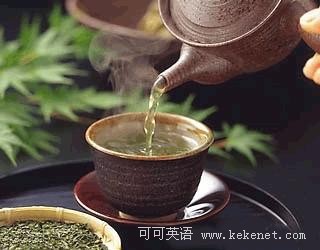
Zhao: in China at least, coffee is often associated with an exotic, well-to-do bourgeois lifestyle. Coffee is often considered a hobby of the well-educated, middle-class people.
在中國,說起咖啡,人們往往會想到異國情調,小資的優越生活方式.喝咖啡通常被認為是有修養的中產階級的習慣.
Tony: maybe that's why some young chaps often spend a whole afternoon in a coffee bar, surfing the net or just typewriting something with laptop. While they are savoring a coffee at a leisured pace, they are actually showing off!
也許,這便是有些年輕人動不動就花一整個下午泡在咖啡吧,擺開筆記本電腦,上上網,或者只是打打文件的原因吧.他們悠閑地品著咖啡,其實也是在炫耀自己.
Z: yes. Behind a lifestyle, there is a culture. Young people easily become blind worshippers of a Westernized life. While they may not really life coffee, they think it desirable and enviable to be lavish with money in those high-consumption places.
嗯.生活方式背后就是文化.年輕人很容易就迷信西式生活.他們也一定喜歡咖啡,但堅信,在那些高消費場所花錢至少令人羨慕.
T: then what about tea? We need to bear in mind in the first place that tea, rather than coffee, has been the most popular drink for the Chinese people.
那你說喝茶怎么樣?要知道,中國人最喜歡的飲料不是咖啡,而是茶.
Z: well. Tea reprements another facet of popular culture. While a coffee bar is usually quiet and resonates with soft, elegant music, a teahouse is often a noisy, crowded, public space. People visit teahouses to associate with others, playing chess, chatting, or simply listening to operas.
嗯,茶大概是代表了大眾文化的另一個側面.咖啡吧是那種安靜,高雅,余音繚繞的地方,茶館則往往是嘈雜,擁擠的公共空間.人們去茶館是想跟人說說話,下下棋,或者只是聽聽戲.
T: what a pity that the traditional teahouses, as depicted Lao She, keep fading away so quickly in this metroplis. It is not easy to find an old-fashioned teahouse that suits the ordinary people's spending power either. Teahouses of today all feature a cozy, comfortable environment, and high-quality services, but can easily cost you a good deal—just like a coffee bar.
可惜啊,在北京這個大都市,老舍筆下那種傳統茶館正在迅速地銷聲匿跡.普通人去的起的那種老茶館再也難找到了.如今的茶館都是那種舒適,愜意的環境,還有高檔的服務,但是太貴了,跟咖啡廳幾乎不相上下.
Z: well, that's true. In a sense, it is not so much what you drink that really counts, as where and how you drink.
這是實話,在某種意義上,重要的仿佛不再是喝什么了,而是在哪兒喝,怎么喝.
生詞集錦
bourgeois: belonging to the middle class 中產階級的
a traditional bourgeois family 一個傳統的中產階級家庭
well-to-do: having a lot of money; rich 有錢的;富有的;富裕的
a well-to-do family 富裕家庭
They're very well-to-do. 他們很闊綽.
Savor: to enjoy the full taste or flavour of something, especially by eating or drinking it slowly 品味;細品;享用
He ate his meal slowly, savoring every mouthful. 他細嚼慢咽地吃著飯,一口一口地品味。
show off: to try to impress others by talking about your abilities, possessions, etc. 炫耀自己;賣弄自己
He's just showing off because that girl he likes is here. 他不過是在表現自己,因為他喜歡的那個姑娘在場。
Worshipper: a person who worships God or a god 崇拜上帝(或神)的人;做禮拜的人;敬神者;拜神者
regular worshippers at St Andrew's Church 經常到圣安德肋教堂做禮拜的人
sun worshippers lying on the beach 躺在海灘上曬太陽的人們 figurative
lavish: large in amount, or impressive, and usually costing a lot of money 大量的;給人印象深刻的;耗資巨大的
lavish gifts/costumes/celebrations 豐厚的禮品;昂貴的服裝;規模盛大的慶典
They lived a very lavish lifestyle. 他們過著揮霍無度的生活.
Bear in mind: 記住
Bear in mind that you'll have to practice economy. 記住要厲行節約.
in the first place: used at the end of a sentence to talk about why something was done or whether it should have been done or not (用于句尾,談論某事為何或是否應該做)究竟,到底,當初
I still don't understand why you chose that name in the first place. 我仍不明白,你究竟為什么取了這么個名字.
I should never have taken that job in the first place. 我當初就不該接受那份工作.
Resonate: (of a voice, an instrument, etc. 嗓音、樂器等) to make a deep, clear sound that continues for a long time 產生共鳴;發出回響;回蕩
Her voice resonated through the theatre. 她的聲音在劇院里回蕩。
Depict: to describe something in words, or give an impression of something in words or with a picture 描寫;描述;刻畫
The novel depicts French society in the 1930s. 這部小說描述了 20 世紀 30 年代的法國社會。
The advertisements depict smoking as glamorous and attractive. 這些廣告把吸煙描繪得充滿刺激和富有吸引力。
Fade away: 逐漸減弱,逐漸消失
Memories of my sister faded away after many years.
過了多年以后,對我姐姐的記憶漸漸淡化了.
In a sense: 就某種意義來說
You are right in a sense. 就某種意義來說你是對的。











